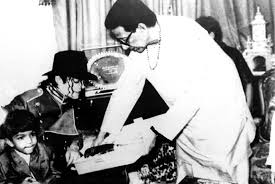Bal Thackeray, Mumbai’s political godfather, died on November 17th, aged 86





In Shivaji Park 46 years later Bal was cremated on a pyre, still wearing his large square sunglasses, before a crowd that was claimed to be one of India’s largest since independence. He had often contemplated his own assassination, gleefully predicting that the whole country would go up in flames. Even after his natural death there was drama enough. Politicians, celebrities and tycoons fought for seats in the VIP enclosure. A city of 18m people came to a nervous standstill for the Tiger of Mumbai.

His was a life, he said, that no astrologer had predicted. His mother wanted him to be a government servant; his father forced musical instruments into his hands. Bal settled on cartoons. He copied the strips in the Times of India for practice, and soon began drawing for the Free Press Journal. When it censored his outrageous output, he strode off, declaring: “I have a mind and nobody can change it.” Soon enough, all Mumbai learned the truth of that.
He started his own cartoon weekly to document the injustices faced by Maharashtrians, “the sons of the soil”. They were, he believed, second-class citizens in their own city. The tycoons, in their swanky palaces, came from outside: Gujaratis, Rajasthanis, Parsis. White-collar positions went to English-speakers, Iyers, Shahs and the rest: you could search in vain in an official phone directory for a single Marathi name. And every day he saw the city fill with migrant scum from all over India who stole jobs, picked pockets and used the street as a toilet.
He drew these things at first in his David Low style, but then he discovered oratory. By God, he was something in his prime. Stick-thin, but surrounded by armed men and images of roaring tigers, he would tell the crowds they were lucky not to be circumcised, that he would settle the border row with Pakistan in a day, that he would hand out Sten guns. His blood boiled inside him. Sometimes his tongue would lash the crowd itself. They still loved him. If they smashed shops or broke heads afterwards, so what?
The formula worked instantly. Shiv Sena won control of Mumbai’s two big councils in 1967 and 1973. After that Bal adapted its philosophy at will. At different points he was against Communist vermin, then idle Southern Indians, then Muslim filth. He loved God, then renounced Him when his wife died. He formed alliances with everyone—the Muslim League, Hindu nationalists, even the left-wing Congress party to break the trade unions. And he was equally prepared to let them all rot.
Power was what the Tiger was after, but of a certain kind. He never held office, and had no interest in being Maharashtra’s chief minister. Instead, he made sure the minister was his puppet. “I am the remote control,” he used to say. Decisions, like cartoons, needed to come from the gut. Not for him tricky questions of sanitation or finance. He preferred wild political gimmicks, from trying to ban Valentine’s Day to marvelling at the “magic” Hitler had.
But what he loved best was to dispense favours from his bungalow, crawling with security men and flickering with the Bollywood videos he loved, or from Shiv Sena’s headquarters, its walls adorned with his drawings and holograms of him on thrones with tigers. Supplicants would kneel and he, sometimes puffing on a choice Cohiba cigar, would deliver. When a sports star needed a house, Bal would provide it. If Bollywood producers struggled to get their films distributed, he would threaten retribution. He was chummy with tycoons, but if a son of the soil lost his job there would soon be a strike called and a mob outside the factory.
His glory years came when religious riots, claiming more than 1,000 lives, tore through Mumbai in the early 1990s. Support for Shiv Sena soared, and it won state elections. An inquiry later found that his party had orchestrated anti-Muslim violence. The Tiger evaded prosecution.
The skyscrapers’ shadow
He was untouchable; but, in truth, his health was going by then. He had left perhaps nothing durable, except the change of the city’s name to Mumbai from Bombay. His son Uddhav, who lived upstairs, took over day-to-day control of the party but was a lightweight. His nephew was a pale shadow of him. There was a gloomy sense that Mumbai had changed. Migration after the 1990s meant that Maharashtrians now made up only a third of the population.
India’s transformation was visible from where he died, north of Shivaji Park, where the logo of an Italian insurance firm loomed large. In the park itself, skyscrapers now cast shadows on the hard soil. Nonetheless, if Bal could have seen his own state funeral he would have much enjoyed it: the VIPs still just terrified enough to pay insincere homage to him; and the vast adoring crowd, still ignorant, still biddable, watching everything he had told them to believe in turning to ash.
No comments:
Post a Comment